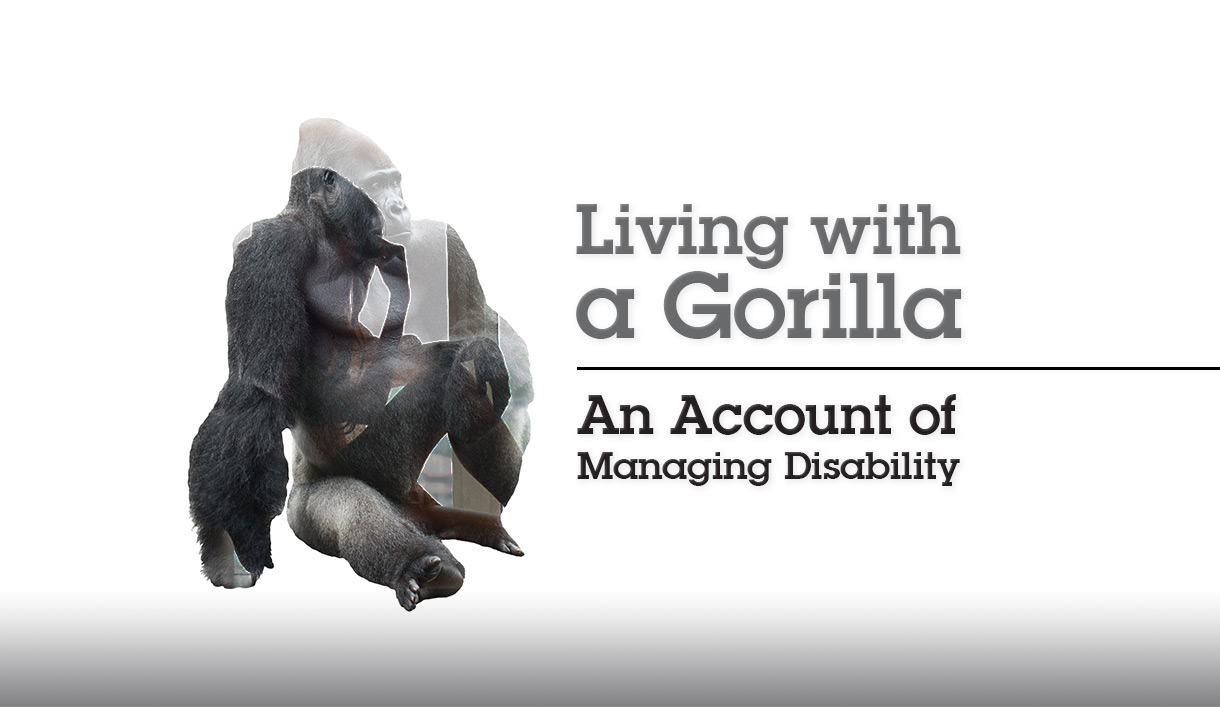Living with a Gorilla
An Account of Managing Disability
For this blog, I would like to share an account of managing disability.
Over the last 2 – 3 years, my life has changed dramatically due to rheumatoid arthritis. Aside from the pain and discomfort, I have experienced a whole new perspective on the world as a wheelchair user.
On the whole, people are very accommodating, my employer, especially. However, using a powered wheelchair is not without difficulties. Learning to steer through doorways (getting wedged was an experience), reversing over my daughter’s foot and demolishing a display rack in a well-known superstore whilst trying to disentangle myself from the ensuing mountain of bras (yes…it had to be the underwear section…) are just a few instances that spring to mind!
The frustration of other people in these situations is usually well concealed, but when my hands don’t work at the till and the people in the queue behind start tutting and feet tapping, that is when I feel it the most – the embarrassment, my own frustration, and the feeling of “this is just not fair”. I will be honest, it has knocked my confidence massively.
I am a frequent visitor to the rheumatology nurses and consider myself extremely lucky to have such a fantastic team available in rheumatology. They are very supportive both medically and emotionally, but there are times, despite all their efforts, there is a limit to what they can do. During a recent visit, I was tearfully explaining how upsetting certain bra-entangled situations are and the nurse told me of the following story.
I feel it reflects my physical and mental health and so I thought it would be nice to share to anyone who maybe feels as I do on occasion, for whatever reason, with whatever disability. Maybe it might also appeal to those who, through no fault of their own, just do not understand. Please don’t misunderstand, there is no reason why they should. However, before you express your annoyance at the queue moving so slowly, or the person in front on crutches, or in a chair that seems to be dithering, please read the following and bear it in mind.
Author Unknown
Acquiring a disability is a bit like getting home to find there’s a gorilla in your house. You contact the approved and official channels to get rid of infestations of wild animals (in this case, the NHS) and they “umm” and “aah” and suck air in through their teeth before saying something roughly equivalent to “what you’ve got ‘ere, mate, is a gorilla, and there ain’t really a lot what we can do about them, see…” before sending you back home to the gorilla’s waiting arms.
The gorilla in your house will cause problems in every part of your life. Your spouse may decide that (s)he can’t deal with the gorilla and leave. Your boss may get upset that you’ve brought the gorilla to work with you and it’s disrupting your colleagues, who don’t know how to deal with gorillas.
You’re arriving for work wearing a suit the gorilla has slept on. Some days you don’t turn up at all because at the last minute, the gorilla has decided to barricade you into the bathroom or sit on you so you can’t get out of bed. Your friends will get cheesed off because when you see them – which isn’t often, because they don’t want to come to your house for fear of the gorilla and the gorilla won’t always let you out – your only topic of conversation is this darn gorilla and the devastation it is causing.
There are three major approaches to the gorilla in your house.
One is to ignore it and hope it goes away. This is unlikely to work. A 300-lb gorilla will sleep where he likes, and if that’s on top of you, it will have an effect on you.
Another is to try and force the gorilla out, wrestling constantly with it, spending all your time fighting it. This is often a losing battle. Some choose to give all their money to people who will come and wave crystals at the gorilla, from a safe distance of course. This also tends to be a losing battle.
However, every so often, one in a hundred gorillas will get bored and wander off. The crystal-wavers and gorilla-wrestlers will claim victory, and tell the media that it’s a massive breakthrough in gorilla-control, and that the 99 other gorilla-wrestlers just aren’t doing it right due to sloppy thinking or lack of commitment. The 99 other gorilla-wrestlers won’t have the time or energy to argue.
I have known people spend the best years of their life and tens of thousands of pounds trying to force their gorillas to go away. The tragedy is that even if it does wander off for a while, they won’t get their pre-gorilla lives back. They’ll be older, skint, exhausted, and constantly afraid that the gorilla may well come back.
The third way to deal with the gorilla in your house is to accept it, tame it, and make it part of your life. Figure out a way to calm your gorilla down. Teach it how to sit still until you are able to take it places with you without it making a scene. Find out how to equip your home with gorilla-friendly furnishings and appliances. Negotiate with your boss about ways to accommodate, or even make use of, your gorilla. Meet other people who are living with a gorilla and enjoy having something in common, and share gorilla-taming tips.
People get really upset about this and throw around accusations of “giving up” and “not even trying”. They even suggest that you enjoy having a gorilla around because of the attention it gets you (while ignoring the massive pile of steaming gorilla-turds in your bedroom every morning and night, not to mention your weekly bill for bananas).
The best way to deal with these people is to smile at them and remind yourself that one day, they too may end up with a gorilla in their house.
Author Unknown








Leave a Reply
Want to join the discussion?Feel free to contribute!